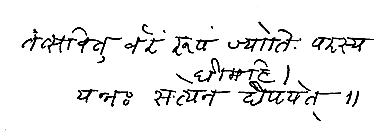The
Gita for the Modern Mind
-Bikas
C. Sen
PROLOGUE
Various spiritual disciplines may be found collected and synthesized in the Bhagavadgita, a dialogue between Krishna, the Divine incarnate, and Arjuna, one of the greatest warriors of his time. The background of the dialogue consists of a sudden depression befalling Arjuna a short while before he was to pass shooting orders in what was going to be the bloodiest warfare of the age, and, one in which almost all the warriors of the country were taking sides. It is interesting to note the place, time and medium the Divine, on this particular occasion, chose to deliver the highest of philosophies to mankind.
A battlefield, minutes before passing of shooting orders and an army commander full of excitement, agitation, tension and even depression — the worst conditions conceivable by the human mind for such a discourse — are exactly what He considers the best. In the midst of all these, Krishna not only delivers His Message but also drives it straight home to Arjuna to convince humanity that however grave the situation, late the hour and perplexed the mind may be, there is always enough time at one’s disposal to refer one’s problems to Him, Who inhabiting one’s heart directs and controls one’s thoughts, feelings and movements, and to open oneself to the Divine to receive His guidance if one truly wants solutions. Confusion, perplexity, agitation, anxiety, fear, frustration, depression and other like forces are there around us — ever eager to creep in unawares and overpower our minds at the smallest opportunity.
If we can keep the spirit of the Divine Message alive in us, we can shut out or at least turn out these influences before they can cause much mischief and confidently and cheerfully ride through all the rough weathers, storms, typhoons and tornadoes with which life may beset us. The present work is just an attempt to extract the spirit of the Message and to express it in a short compass and in terms agreeable to the modern mind. If the reading, construction and rendering of the Message have been correct, they have been made possible by Krishna’s Grace and I am grateful to Him.
If there has been any misreading, misconstruction or misrepresentation of the Message or any aspect of it, it must have been caused by my poverty of intellect, perversity of mind and paucity of words and I pray that He may be pleased to enable my readers to get at its true spirit.
Epilogue
The divine master proves to Arjuna that He is the Almighty. He shows him that He is all in all in the Universe. He tells him that virtue or sin does not find any place with Him. He proclaims that He does lift the veil of Maya from one, at His pleasure. Yet He does not lift the veil from Arjuna to enable him to realise His true Nature. Even after all He says and shows, Arjuna is incapable of rejecting his conception of sin which had driven its roots quite deep in his heart. As if as a last resort, the Lord offers him absolution from all sin. “Abandon all laws of conduct and take refuge in Me alone; I will deliver you of all sin and evil; do not grieve!" He says and enjoins on him the work of the undiscriminating massacre of his own kinsmen. Notwithstanding that it may sound sacrilegious, in the legal parlance such an offer is construed to be an offer of bribe. He could easily have caused a natural calamity to eliminate all the people He did not want upon the earth. But, that was not His will. His purpose was to impress upon Arjuna, and through him to all humanity, that one has to rise above all virtue and sin. To set an example, He, Himself, does something gravely unethical and illegal in the human parlance to actuate Arjuna to take up arms against his near and dear ones.
Earlier, He had told Arjuna that in the dice of the swindler He is particularly manifest. It is with such a dice that Arjuna was swindled of his kingdom by his cousins. Thus had Krishna created the background of the war. Had he not willed it, would the war be necessary or would the depression have befallen Arjuna?
He causes swindling. He causes declaration of the war. He causes depression in Arjuna. Lastly, He promises to absolve Arjuna of all possible sin and evil — that he might apprehend — in order to induce him to fight the bloodiest warfare of the age. Such is the game that the Divine plays with all humanity.
The funniest part of His game is that the Message He had delivered to the world through Arjuna is read by millions and millions of people and discussed by and between millions and millions, but apart from a negligible minority, no one can even get the cue as to how the same can be put into practice. Many of those, who are able to take up the practice, are often led astray. Most of us are compelled to dance grudgingly and grumbling to the tune that He sets for us. He declares that we may choose to dance to the same tune willingly and cheerfully as His partners. The question, therefore, looms large before us:
“Knowing full well that unless He wills so, we shall not be able to play with Him His game as His willing partners, should we or should we not make an attempt to do so?"
 |



